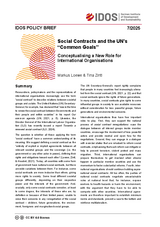Policy Brief
Social contracts and the UN’s “Common Goals”: conceptualising a new role for international organisations
Loewe, Markus / Tina ZintlPolicy Brief (7/2025)
Bonn: German Institute of Development and Sustainability (IDOS)
DOI: https://doi.org/10.23661/ipb7.2025
Researchers, policymakers and the representatives of international organisations increasingly use the term “social contract” to describe relations between societal groups and a state. The United Nations (UN) Secretary-General, for example, has declared that “now is the time to renew the social contract between Governments and their people and within societies” in his report Our common agenda (UN, 2021, p. 5). Likewise, the Director General of the International Labour Organization (ILO) has recently issued a report Towards a renewed social contract (ILO, 2024).
The question is whether all those applying the term “social contract” have a common understanding of its meaning. We suggest defining a social contract as the “entirety of explicit or implicit agreements between all relevant societal groups and the sovereign (i.e. the government or any other actor in power), defining their rights and obligations toward each other” (Loewe, Zintl, & Houdret, 2021). Today, all countries with some form of government have national social contracts, but there are wide variations between them. For instance, some social contracts are more inclusive than others, giving more rights to society. Some treat different societal groups differently, depending on their respective power and the interests of the government. And, crucially, only some social contracts consider, at least to some degree, the interests of those who are, by definition or because of their limited power, unable to voice their concerns in any renegotiation of the social contract – children, future generations, the environment, foreigners and marginalised social groups. The UN Secretary-General’s report rightly complains that people in many countries feel increasingly alienated from the social contract (UN, 2021, p. 22) and that social contracts ignore the rights of future generations. In many countries, social contracts give rights to some influential groups in society to use available resources without consideration for less powerful groups, future generations and environmental concerns. International organisations thus have four important roles to play. First, they can support the national process of social contract renegotiations: ease the dialogue between all interest groups inside member countries, encourage the involvement of less powerful actors and provide neutral and open fora for the negotiations. Second, they can engage in a dialogue with member states that are reluctant to reform social contracts, emphasising that such reform can mitigate or help to prevent terrorism, violent protest and mass migration. Third, international organisations can prepare themselves to get involved when shocks happen in particular member countries and use the momentum to foster substantial reforms. Fourth, international organisations should continue building supra-national social contracts. All too often, the parties of national social contracts negotiate unsustainable rules at national level that, for instance, expose workers to health hazards or harm the environment, with the argument that they have to be able to compete with other countries. International agreements are therefore important to establish minimum norms and standards, prevent a race to the bottom and reinforce multilateralism.
Kontakt
Cornelia Hornschild
Koordinatorin Publikationen
E-Mail Cornelia.Hornschild@idos-research.de
Telefon +49 (0)228 94927-135
Fax +49 (0)228 94927-130
Alexandra Fante
Bibliothekarin/Open Access-Koordinatorin
E-Mail Alexandra.Fante@idos-research.de
Telefon +49 (0)228 94927-321
Fax +49 (0)228 94927-130





